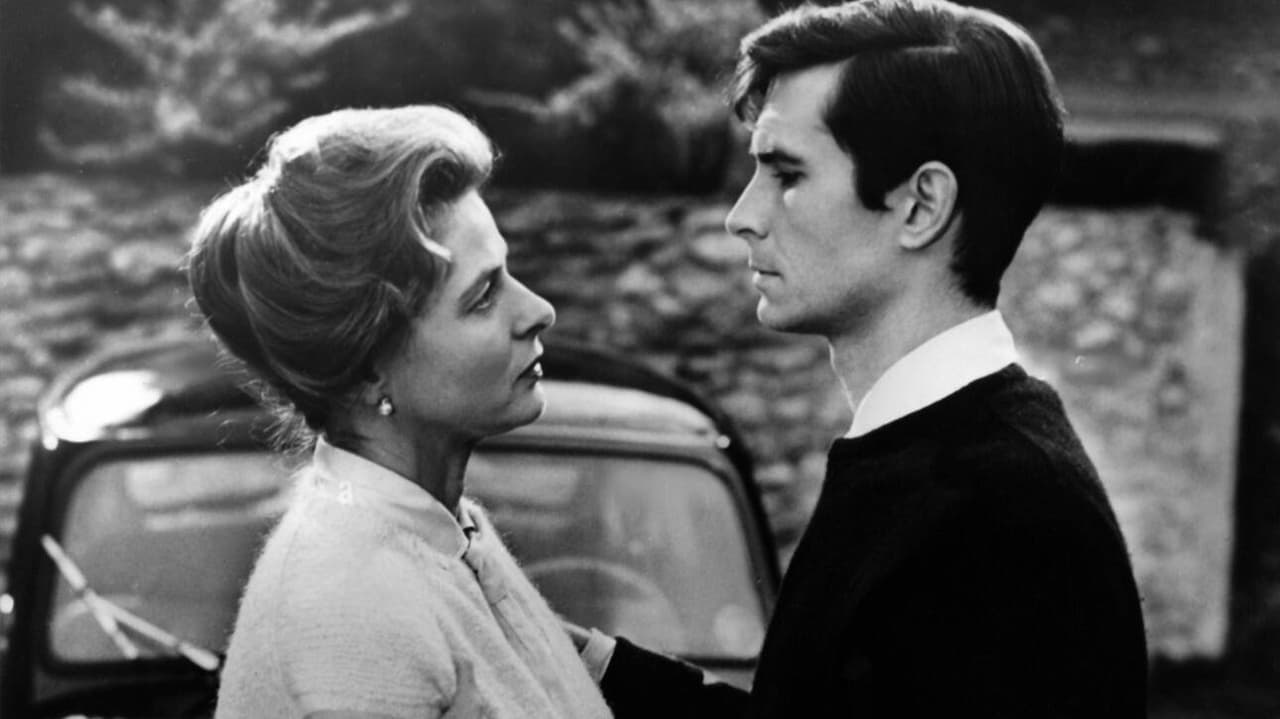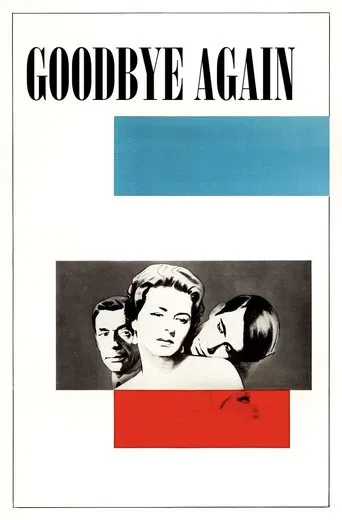

In Paris, matronly interior decorator Ingrid Bergman (as Paula Tessier) fears, at 40, she's getting old. Playboy businessman Yves Montand (as Roger Demarest) cancels a dinner date with Ms. Bergman. After their next engagement, Mr. Montand doesn't stay for sex with Bergman. Instead, he goes out to pick up a younger woman. Obviously, their five year affair has lost its luster. Later, Bergman meets a wealthy client's son, bubbly law student Anthony Perkins (as Philip Van der Besh). He's 25-years-old. Immediately attracted to his mom's decorator, Mr. Perkins takes Bergman for a ride in his fast sports car and invites her to lunch...Produced and directed by Anatole Litvak, "Goodbye Again" features a trio of stars who certainly looked better on paper. We don't see much for Bergman to find attractive in either Perkins or Montand. Frankly, Bergman isn't especially attractive to either man, either. There is little passion in either pairing. Bergman is morbid. Perkins too silly. Montand seems disinterested even in the sexpots that appear in his bed. Other than having the younger heads popping in front of the camera, Mr. Litvak's dance scene near the end looks good. He uses automobiles to parallel his characters; at one point, Bergman's tears cover her car's windshield.**** Goodbye Again (5/61) Anatole Litvak ~ Ingrid Bergman, Anthony Perkins, Yves Montand, Jessie Royce Landis
... View MoreAs a reviewer said here, when we praise a movie, we overdo it, and when we diss one, we're really down on it.But, this has to be one of the best movies Ingrid Bergman ever made. The casting in this movie was inspired. Ingrid loves Yves Montand, but he won't commit to the married life, and Montand is perfect as the man who wants both his freedom and Ingrid, who also has her freedom to date other men, but doesn't want to. "Some freedom," her maid says. Her maid is like the french equivalent of a Thelma Ritter character.Ingrid is an interior decorator. Enter Jessie Royce Landis, who is just great as an exacting and demanding (and cheap) client of Ingrid's, who's also very rich. Enter Anthony Perkins, soon after making "Psycho," as Landis' son. He obviously falls for Ingrid, and she loves the attention, since she's unhappy with her situation.The rest you have to see for yourself. The viewer is on a roller-coaster ride of emotions, as we feel everything Ingrid feels and even Tony, too. Miss this and you miss true actors at their best. By the way, do you like Brahms?
... View MoreA literate script and excellent acting and direction elevate this love triangle to art.One of the best scenes, late in the picture, takes place on the dance floor of Maxim's and has NO dialog--just facial expressions culminating in a touching of hands.The original French title, "Aimez-vous Brahms?", is reflected here in the use of Brahms's Third Symphony. Again, the feeling is conveyed by the music and the facial expressions of the actors. This music, long familiar to me, took on a new meaning.This is a film made by adults for an adult audience--a 40-year-old audience will appreciate it, a younger audience will not.
... View MoreAll three characters are distinct in their expression and pursuit of "being loved." We have all encountered a Roger - cool, indifferent, the free spirit that cannot be tamed, and furthermore, does not WANT to be tamed. Yet he cannot be alone. We all have personally experienced the terrifying moment in our lives of becoming a man/woman over night. Phillip is clearly not prepared to emerge from his childhood of security and entitlement, his choices always having been guided by a mother, or the underlying norms of his social circle. The daunting task of assuming his own identity leads him to attach his self to Paula, forming a classic example of codependency. His choice for an older woman is his way of prolonging the actuality of having to develop his own identity, his own path. For example, when Paula goes to work his day consists of nothing but finding things to do to kill time until she is back to entertain him. It is as if without her presence he is on the "pause button," and only resumes life on her cue. Paula, however, sees this as is not pleased. Paula is the most interesting character, because her feelings and behavior in this film are so diverse that just when we think it is apparent how she is feeling she does something that questions our previous assumption. Roger is the classic ladies' man, his stance staunch against the wind. Phillip is the typical tragedy that happens to a boy who has been given everything, yet has never asked for anything. These two men are simply unilateral characters framing the abstract piece that is Paula. Does she really want Roger to commit to her? We think the obvious answer is yes, but then we see her with young Phillip - we see her with this sexual energy and freedom that she cannot suppress, and we wonder whether Phillip is simply an outlet for her emotional frustrations with Roger or whether he is not actually a venue for her to express her own longings for excitement, trysts and desires. Yet we learn more from the scene in the bedroom, with the single shot of Paula lying in bed after (we assume) Paula and Phillip have shared an intimate moment. Her facial expression tells us she has reservations about leading this lifestyle; she knows it will not work. It is almost as if in that moment, watching Paula's facial expression, we are swept back to a time when we ourselves were caught in a relationship, or an act, that we knew were were going to regret later, but could not stop ourselves in the moment. Diane Lane's subway scene in "Unfaithful" draws many similarities to Ingrid Bergman's bedroom scene. Another scene where Paula bears her emotions, yet reluctantly, is when she is having lunch with Roger after he has just returned from his 10 day trip. She reveals to him that her friendship with Phillip has become more serious. She tells him this not for honesty, nor to inform him that she is moving on, yet she tells him this to see his reaction. This is a pitiful scene. When Paula complains that she always has to hear about his girls, he says something along the lines of that at least his is normal. In other words, he has called Paula a joke. There is a beat, and we feel the impact that she feels. As she stumbles away from the table we see exactly how vulnerable she is, how insecure she actually is about her age. We don't want to, but we feel sorry for her. We feel pity for her because there are moments when she is with Phillip when she appears truly happy, and yet the stigma attached to the relationship causes just as much misery. However, in the end, when we learn that she will never find that true happiness (with love), we are hesitant to feel that same sympathy for her. Is it because she pursued a love that she knew she would have to share? Or is it because she sacrificed the only love that ever really made her feel happy, and young?
... View More